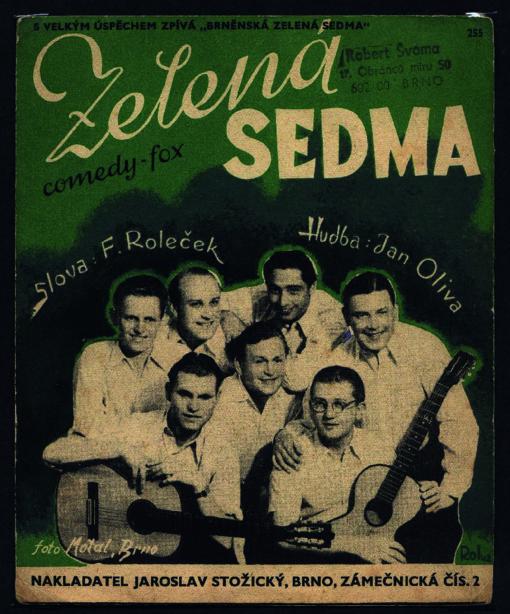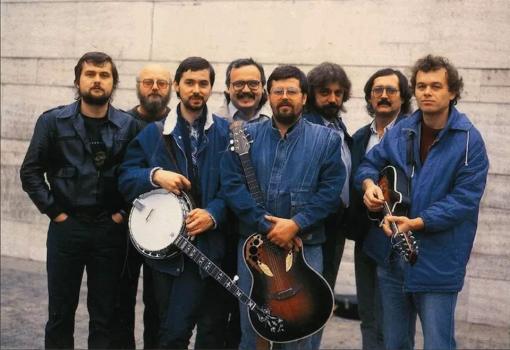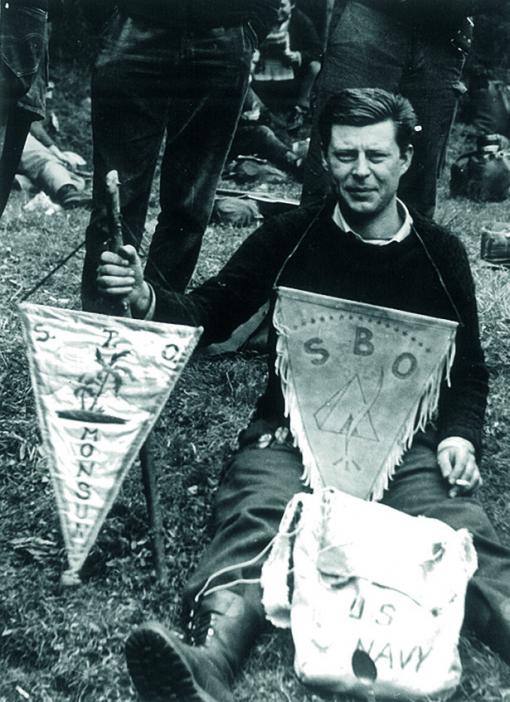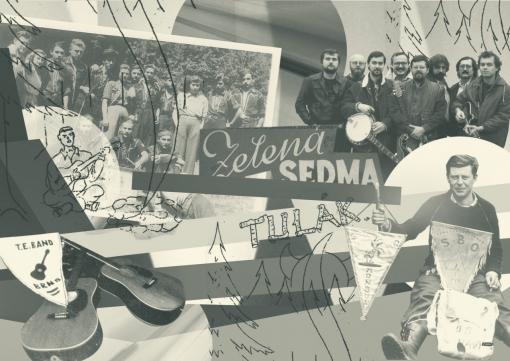”It’s a long journey to the West, / Pointless, fruitless is the longing,” began the first cowboy song recording issued by R. A. Dvorský’s publishing house in 1939. The theme and tone reflect the “tramping” movement, with its idealized vision of “America” and its unspoiled “nature”, which led Czechs to take to the woods, where they hiked, met round campfires and sang songs modelled on American folk songs and country music. So widespread was the tramping phenomenon that it made its way into popular music, where it long remained. Over time, the romance of the cowboy and the idea of a free life on the Great Plains found their way not only into songs sung by such late twenti- eth-century stars as Karel Gott, Helena Vondráčková and Waldemar Matuška but into social life itself: very few countries in Europe have such liberal laws when it comes to sleeping overnight, or even setting up camp, in the woods. In the past young people in Brno could choose whether to be “city slickers” hooked on discotheques or “wander- ers”, who would head for the main train station every Friday afternoon or Saturday and from there set out on the first train for wherever in the countryside it was heading to.
The Romance of the Outdoors
Tramps, modern folk fans, lovers of country music - it’s probably owing to the Porta music festival, which caters to all three groups, that many people put them in the same bag. But tramps just laugh at this: they’re the single truly original Czech sub-culture, with no coun- terpart anywhere else in the world. Deep roots and unbelievable tenac- ity mark tramp music, modern folk and country music - three genres that, despite all their differences, are inseparably linked together in this country.
The beginnings of Brno tramping date back to sometime around 1937, when the Mládí settlement was established. This year one of its founding members, Ladislav “Fidler” Krevňák, celebrated his ninety-fifth birthday; he’s still a member of the Žízeň group. He survived - like the tramping move- ment itself - the eras of Nazi and Communist persecution and was there when Brno bands emerged with their own original repertoires. The early years of the Porta festival saw successful appearances by the rather traditional Vavasatch (1969) as well as the more modern, light swing Příboj (1973). But the Karabina band showed that you could become a legend without winning any prizes at Porta.

Tramps vs. Uniformity
The greyness of the “normalization” era in Brno following the Soviet invasion in 1968 was significantly dispersed by the Ozvěna group, whose songs were sung every- where. Equally important was the concert series of the Friends of Campfires, which Ozvěna organ- ized. The singer Pavla Střechová (Dvořáčková) could be considered a symbol of how genres and indi- viduals intermingle in Brno: after leaving Ozvěna she became one of the founding members of the mod- ern folk group Bokomara and also belonged to the Brno rock group Progres-Pokrok. A fixed star that arose out of tramping is the Brno band Kamelot, whose leader Roman Horký led a recent campaign to block a plan to build a dam on the Oslava River, a favourite “stomping ground” for tramps.
Modern Folk and Rock in one Big Heap
In 1964 Brno was the first stop on American singer-songwriter Pete Seeger’s tour of Czechoslova- kia. The soul of the international modern folk music movement, Seeger gave a huge boost to the emergence of different varieties of Czech modern folk, whose form was in fact derived more from American models than from local traditions. (Probably Seeger himself would not have been very happy about this.).
In 1974 Folk Team began its march to the heights of Czech modern folk with the musical personalities Roman Venclovský and Ivan Huvar. The band leader Pavel Kopřiva is also active in the modern folk scene as a CD publisher and manager. Jiří Vondrák is a phenomenon on the Brno folk scene, having helped found several bands. He played in the Vondrák – Bodlák duo, and in the Bowle trio he appeared with the rockers Pavel Váně and Richard Lašek from the Bronz band. Vondrák’s concerts at times included Czech translations of songs of the Soviet singer-song-writers Bulat Okudzhava and Vladimir Vysotsky. He’s also a screenwriter and director of documentary films dealing thematically with tramping and modern folk.
For many years Brno was home to one of the greatest Czech sing- er-songwriters - Slávek Janoušek. But Nikola Mucha also began her career as a singer-songwriter so- loist with a guitar, as did the solo musician and front man for Květy Martin E. Kyšperský. The closer modern folk approaches the present day, the harder it is to characterize it as a separate genre. The univer- sal American term “songwriter” is also coming into fashion in Czech to designate someone who creates songs and sings them as he or she feels most appropriate, paying little attention to stylistic classification. For a long time Zdeněk Němeček has operated at the borderline between modern folk and rock; as singer-songwriter with the Quanti Minoris group he works with “hard rock” inspired by medieval music.
The Banjo - At Home in Bluegrass and World Music
When the term “songwriter” crops up, then in Brno it’s immediately associated with Robert Křesťan, a superb artist who in addition to his own work dedicated one of his albums to translations of Bob Dylan and paid homage to Leonard Cohen in a song entitled “Víla”. He began with the tramp band Trapeři and in the 1980s moved to the bluegrass group Poutníci - their combination of a strong creative leader and a band with outstanding players was a phenomenon unmatched in the Czech context. When Křesťan and the banjo player Luboš Malina left Poutníci in 1991 to found Druhá trava, they worked from a bluegrass base to create a top-flight band with a contempo- rary, distinctive sound. The man- dolin player Jiří Plocek was also a member of Poutníci; after leaving it he founded the world music oriented Tea Grass. Etno Brno, an annual series of concerts in the Stará Pekárna club, serves Brno a regular dose of world music.
 Poutníci at the height of its popularity in the 1980s. Photo: Supraphon
Poutníci at the height of its popularity in the 1980s. Photo: Supraphon
At times the composer and pianist Zdeněk Král also strays into the world of the singer-songwriter. A Knife for Silence, an album that he recorded with the singer AndRea Buršová and the crossover group Indigo Quartet, is magnificent, and in its way links up with the reticent legend of singer-songwriting for the theatre Jiří Bulis (1946–1993).
Ours is the Strength of Forty
Tramping is characterized by many external attributes, roman- tic attitudes and rituals that may strike outsiders as laughable. But its basic feature is fellowship, and wherever there are “tramps”, they create “settlements” – gathering places in the great outdoors, with a rudimentary shack or two and a campfire site, all overseen by an elected “sheriff”. Each settlement has its own name.
In Brno and its surroundings this independent fellowship began to take shape at the end of the 1930s, and its self-imposed internal discipline and independence were to prove anathema to both the Nazis and the Communists. Sur- prisingly, the rapid development of the tramping movement in the Brno region coincided with the approaching German occupation and the beginning of World War II. In 1943 the idea arose of linking to- gether the Brno-based settlements. Representatives of six settlements met to discuss the proposal.
So on 10 April 1944 around one hundred tramps gathered in a meadow north of Brno, headed by the sheriff of a settlement named Český lev (Bohemian Lion). Aston- ishing. And equally astonishing is how a settlement named after the Czech heraldic symbol escaped the notice of the Nazi authorities.

The true history of the League of Brno Settlements (SBO), however, begins on 24 June 1945, when representa- tives of the Caballeros and Rowers settlements held a major celebra- tion (”potlach”) north of Brno.
That August the League was officially proclaimed. By 1948 more than forty settlements were represented and tramps throughout Czechoslo- vakia were invited to attend joint events. The grand potlach in the autumn of 1948 took on the char- acter of a national tramp assembly.
The later fate of the League mir- rored the political situation. After the Communists came to power the existence of an independent insti- tution was unthinkable, as was the publication of the tramps’ magazine Tulák. The League revived with the political thaw in the 1960s. Of the original members, Rowers, Sosna and Netopýr still exist. In 1987 an informal grouping, Old Boys Brno, began carrying out activities in the spirit of the League.
































No comment added yet..